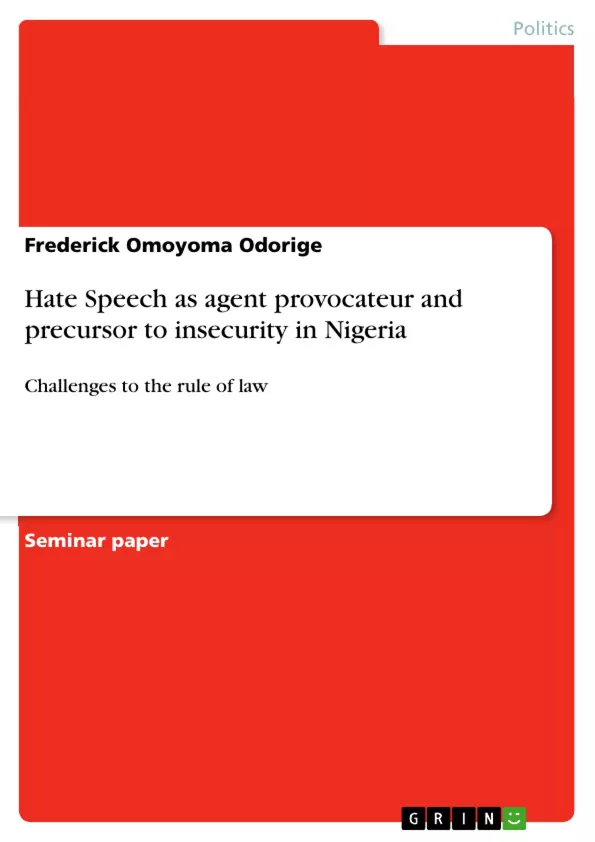Many Nigerians seem not to be fully aware of the real meaning, implication and their rights to seek redress whenever they find themselves verbally attacked with the prejudices that comes with hate speech which is loaded with intentions to seclude and dehumanize. A country and its citizens must respect the rule of law in order to enhance mutual co-existence.
When hate speech is historicized in Nigeria, it shows the role that it has played in catapulting religious, cultural, political and economic differences to a level where uncertainties and tensions are brought to bear. Hitherto, hate speech was not entrenched in the Nigerian constitution until its effects began to threaten the peaceful co-existence of the country especially under the government of President Buhari.
This paper sets out to examine in details, how various persons have used hate sheech to achieve their selfish purposes at the detriment of national interest. It will analyse the intentions of such persons and profer solutions to ameliorate its divisive effects. It will go further to examine various ways through which citizens could easily seek cushioned redress.
Inhaltsverzeichnis (Table of Contents)
- Introduction
- Literature review
- Abstract
- Methodology
- Cases of hate speeches and their effects..
- Recommendations.
- Conclusions
Zielsetzung und Themenschwerpunkte (Objectives and Key Themes)
This paper explores the complex issue of hate speech in Nigeria, examining its role as an agent provocateur and precursor to insecurity. The paper analyzes the impact of hate speech on various aspects of Nigerian society, including politics, religion, and ethnic relations. It investigates the lack of explicit legal frameworks to address hate speech and the consequences of this absence.
- Hate speech as a catalyst for insecurity in Nigeria
- The need for legal frameworks to address hate speech
- The impact of hate speech on Nigerian society
- The relationship between hate speech and freedom of expression
- The role of prominent individuals and media in perpetuating hate speech
Zusammenfassung der Kapitel (Chapter Summaries)
- Introduction: This chapter sets the stage by outlining the increasing concern over hate speech in Nigeria and the government's efforts to criminalize it. It explores the diverse interpretations of hate speech and its potential to ignite conflict in a multicultural society like Nigeria.
- Literature review: This chapter provides a comprehensive overview of hate speech, drawing from various definitions and perspectives. It examines the legal landscape in Nigeria concerning hate speech, identifying relevant existing laws and their limitations.
- Abstract: This chapter summarizes the key arguments and objectives of the paper. It highlights the paper's focus on the historical and contemporary role of hate speech in Nigeria, its impact on societal harmony, and the need for effective legal and social responses.
Schlüsselwörter (Keywords)
The key themes and concepts covered in this paper include hate speech, insecurity, rule of law, freedom of expression, ethnic and religious conflict, political discourse, legal frameworks, societal harmony, and national interest.
Frequently Asked Questions
What is the impact of hate speech on national security in Nigeria?
Hate speech acts as an agent provocateur, catapulting religious, cultural, and political differences to a level that creates uncertainty, tension, and insecurity.
Is hate speech explicitly covered in the Nigerian constitution?
Historically, it was not deeply entrenched, but its threatening effects on peaceful co-existence, especially recently, have led to efforts to criminalize it and strengthen legal frameworks.
How does hate speech affect freedom of expression in Nigeria?
The paper examines the complex relationship between the right to free speech and the need to prevent dehumanizing language that leads to conflict.
What role do prominent individuals play in the spread of hate speech?
The study analyzes how various persons use hate speech for selfish purposes, often at the detriment of national interest and societal harmony.
What are the recommended solutions to mitigate hate speech in Nigeria?
The paper suggests establishing clearer legal frameworks, respecting the rule of law, and providing accessible ways for citizens to seek redress when attacked.
- Citation du texte
- Frederick Omoyoma Odorige (Auteur), 2017, Hate Speech as agent provocateur and precursor to insecurity in Nigeria, Munich, GRIN Verlag, https://www.grin.com/document/377632



